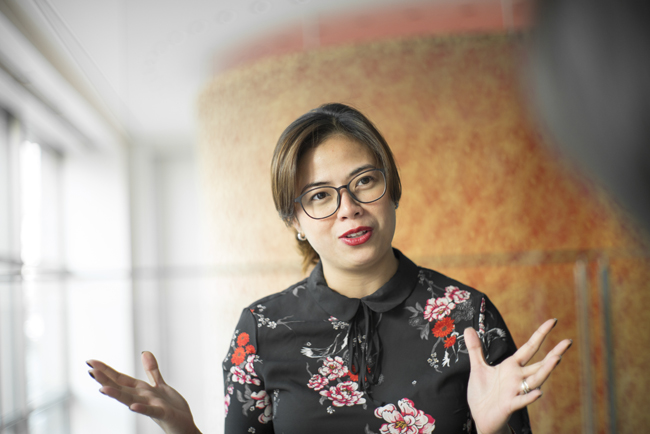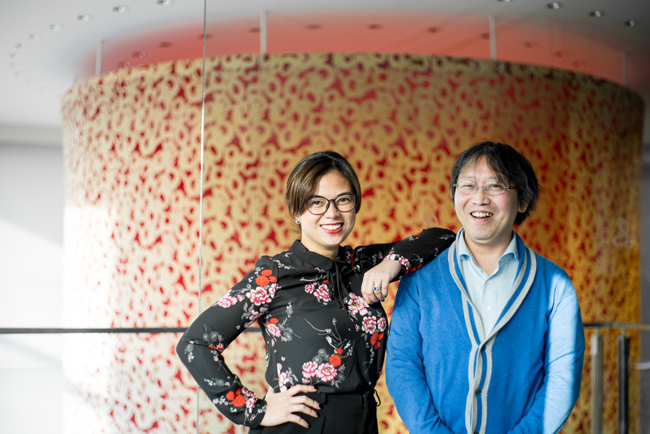To broaden the base for Philippine Cinema
Okada: I'd like to ask you about the film screening activities, about Cinematheque screening. You already have five locations, in five cities: Manila, Baguio, Iloilo, Davao, and Zamboanga. So you've been doing that, which I heard already in Manila. The Cinematheque Manila which I visited in 2016 was newly completed. So I'd like to ask you about your concept or idea or how it's going about.
Dino: One of the challenges of the Cinematheque is to find its audience. But precisely how we found this opportunity for the Cinematheque to be an audience development problem. So what we do instead of just film screenings – because before, it was just film screening – we made all our screenings event-based. So it actually started in November when we started doing thematic events in Cinematheque, where we invite directors, speakers, film lecturers, to talk about the film before its screening. So right now after around almost a year of this change or this transformation in terms of approach, our Cinematheques are always full house. It has become a home not just for films, but it has become a home for important events. One of the significant events that we had was in March. It was women's month. We had events where there was discussion about gender development, women in filmmaking, important women filmmakers; we were showcasing them, at the same time that we were curating films for screening.
We also started digitizing our experimental films. In the 1970s there was this experimental cinema of the Philippines by Ferdinand Marcos. And there were a lot of films in our collections during the experimental cinema. So we are working with the Kalampag Tracking Agency in a partnership to screen the films, I think in 35mm film. We had a screening in Cinematheque Manila where we screened in 35. So this is an ongoing event to also showcase the collections that we have and to really inspire young film enthusiasts to be interested in archiving. It was very successful. It was a full house. I mean, that was such a big accomplishment for us, because nowadays we all use our Blu-Ray and our DCPs. But we actually had a 35 millimeter projection at the booth to show these films.
The Cinematheque has also become a home for embassy film festivals, meaning different countries having their film festivals in the Philippines. So they're able to watch Spanish films, Korean films, Argentinian films, Latin films, because of these art house cinemas. The embassies have their own film festival. The Japan Foundation also annually holds their Eigasai, a Japanese film festival. Before, Eigasai was just seen in Manila. But this year, actually it's the very first because of the 20th year of Eigasai, we're able to show the Eigasai film festival in Baguio, in Iloilo.
Okada: So American films...you can just watch them in any regular cinema. But it's not the same for European or South American, etc., art films in particular, the opportunity to watch them is rather limited. So, do you buy like nonprofit rights and then you show them? Is that what you do as well?
Dino: Well, the embassies in the country are actively bringing films to the Philippines. Our system of supporting the embassies made it easier for them to bring films because the rating, the censorship, goes through us. So you don't have to go through the censorship board, because FDCP has the ability to make it easier. So what they do is they partner with the film agency in their country. They bring the films, they talk to us, and we help them do the film festival. We actually give financial assistance, to put together these festivals. And in exchange, we're able to show the films in different regions of the country.
But right now we also have a new partnership with the biggest cinema chain in the Philippines, called SM. It's called Cine Lokal. They gave us eight cinemas in the biggest malls in the country. So it's actually a commercial cinema, but we want to turn it into an art house cinema, so that we are able to show films... Of course our first goal is to have a platform for our art house filmmakers, for art films to have a place in at least a dedicated cinema for them. And secondly, so that we can bring in European titles, Asian titles, ASEAN titles that need to be seen by the Filipino audience. So we want to train our audience to just have diversity in terms of their films. It's not just all American films, which you know how it is dominating the commercial industry. I think right now SM and other cinema chains want to show that they support local films. This is practically a charity effort, if you're going to think about it, because it's a platform to develop the audience. But they work with us, we see them as partners and allies, and I think right now they realize that if we are able to expand our local audience through these dedicated cinemas, we'll have a better opportunity to help our local filmmakers to make better films.

Okada: So you collaborate with the local commercial cinemas.
Dino: And for the FDCP, we had an FDCP-initiated event we called a "Feast of Filipino Films" in August. August is our national language month, and we were proposing for the president to also proclaim it as national film month. So for this event, we had one week in cooperation with all the cinemas in the Philippines, like 830 of them, showcasing 12 chosen Filipino films for this whole one week of screening. So it happened this year, it was our very first event. And it was so successful because even places in Zamboanga would see Filipino films in commercial screens, which doesn't normally happen. So for me, it was a really very special event, because I felt like it's the first time that the government, private sectors, exhibitors, and the producers worked together to celebrate and to give importance to our local cinema.
Okada: There's a festival in the Philippines I'd like to talk about. The FDCP will collaborate with them? How do you work with the film festivals in the Philippines?
Dino: So right now we have local independent film festivals, big ones, that are all based in Metro Manila. We have Cinemalaya, Cinema One, QCinema, ToFarm, CineFilipino, and Sinag Maynila. So all of these six festivals have given grants to filmmakers to make their films. So normally just from these film festivals alone, we come up with around 6 to 10 films. So just by this, you have already around 80 films coming from these festivals. So the FDCP support is one, we are a partner. It's called a festival partnership program, where the FDCP handles the ratings of the films in terms of age-appropriateness. We also sponsor filmmaker's night and conferences and workshops within the event.
With regional film festivals, we are right now supporting around 18 regional film festivals all over the Philippines by helping them come up with a more sustainable event and program for them to engage the regional film communities. We have workshops all over the Philippines right now. We hold technical workshops for regional communities that still don't have the capacity or the level that the Filipino filmmakers from Manila have. And film appreciation lectures and also symposiums for teachers, so that the teachers will see the importance of film as a medium and as a tool to educate.
Okada: You said that in the Philippines film festivals played a major role in assisting production; it's a unique system. Making films costs a lot of money. How are those festivals able to have a capacity to fund film production?
Dino: The film festivals give around $20,000 to $40,000, and it becomes seed money for them to produce their films. In the Philippines, filmmaking is relatively cheaper in terms of production. So you can actually make a film for $50,000 or $60,000 to $100,000 and you can already say it's a decent art film. But in terms of production and technical, you need a lot of work on that. But the stories are there and the film is complete. So that's what they do. Actually, these film festivals do this for content creation. They want to acquire the films for content. But it has become a platform for filmmakers to really make their films. So it's very unique because it really enhances creativity from the filmmakers. But there's also a big downside to this process. Because right now it has created a culture of rushed films, films that are done within a very limited time frame, and low-budget films. So in terms of salability, in terms of quality, in terms of production value, we kind of suffer from that. So there has to be a way to shift towards more quality in terms of technical aspects of all that.
Okada: What is your relationship with international film festivals?
Dino: Right now we have around five major film festivals that we participate in. And we have a Philippine Pavilion now. So we have Hong Kong Film Market in March; Cannes Film Festival, we are in the Marché du Film; also Asian Film Market in Busan Film Festival; Tokyo JCS, the TIFFCOM in Japan; American Film Market also in the US. So in all of these locations, all of these events and festivals, we have a Philippine Pavilion. And that's where we invite producers to join us and participate and sell their films there. So we want to promote their cinema, and we're able to give this platform for them. Because we want to really teach now our producers to look at the afterlife of the screening, after the exhibition of the film, what happens next. How do you create sustainability? How are you going to find revenue streams for your films? So we want FDCP to be the place where they can look for distributors, look for sales agents. Also we hold Philippine nights. It's a networking event for our filmmakers to connect with industry movers and shakers from other countries. So it has been very successful... At the film festivals, because now some of the new projects of our filmmakers are because of these partnerships with the people they meet.
And at the same time we also have a new program called "Spotlight on Philippine Cinema." So, we want to encourage these film festivals and FDCP will be a partner. So, like next year, Osaka Asian Film Festival just approached us and they want to have a tighter partnership with the FDCP. They're going to do a special program on Philippine cinema (held in March, 2018). In celebration of 100 years of Philippine cinema, we're partnering with Osaka Asian Film Festival to have a special program on our films. So we do these efforts with different recognized film festivals all over to have this. Also, because we have been hosting a lot of embassies in the Philippines, we also talk to them. We also talk to them and ask them, "Why don't you hold a Filipino film festival in your country? Because you're always holding your film festivals in our country." So I think next year, the Italian embassy is working on having a Filipino film festival in Florence (held in March, 2018). We're very excited. Hopefully Japan too!

Okada: At this point, the current government to disseminate film culture, are they active and cooperative in pursuing this?
Dino: For the first time, after decades of culture not being part of the social agenda, not just film but culture per se is part of the social agenda of this present administration. There's also a move towards creating a Department of Culture. So whether it pushes through or they see the benefits of having a Department of Culture, the fact that this government is actually seeing culture as part of transformation and of nation-building, I think that's something that should be celebrated. And actually even now, the president has this goal for "Build, build, build." So it's infrastructure-based. The cinematheques are in the "Build, build, build" campaign. So actually for next year, if the budget permits, we have identified five other cinematheques to be built next year.
Okada: So it sounds like things are going up.
Dino: Yeah, I would hope so. I mean we have to support how Philippine cinema is faring outside the country. I mean they say Philippine cinema is approaching the Third Golden Age*3 because we are winning left and right in terms of film festivals recognizing Philippine cinema. So we have to simultaneously be able to support that in the Philippines.
*3 Since the Cinemalaya Independent Film Festival was founded in 2005 to support young filmmakers, a new wave of independent films has emerged, earning a global recognition. Its leading directors include Brillante Mendoza, Lav Diaz, and Raya Martin.

Okada: The FDCP's another major role is to support film production. If you could also expound on that, are you taking any particular measures, or do you have a support system?
Dino: In 2008 we had the executive order from the former president, Arroyo, to build the Philippine Film Export Service Office. It's called PFESO. So it's actually the office that takes care of international productions in making FDCP a one-stop shop for these foreign productions. But it was dormant until 2016. There was no active effort to really create a system for it. So right now we have fully activated the office. We are in touch with all the line agencies. We want to be the back-end channel of all the big agencies: Department of Finance, Department of Tourism, Bureau of Customs, Bureau of Immigration, and all these agencies that will make it easier for foreign productions to do business with the Philippines. You know how it is, one of the major hurdles of working with the Philippines is the bureaucracy, red tape, and corruption. We want to do away with that. We want FDCP to be the only agency you will go to. And we will take care of everything else. We also want to create incentives for foreign production. So we are working with local government units to form their own commissions so that they can come up with these incentive programs for the foreign productions. So all of these right now are being put in place. Our film markets are more focused and more targeted towards attracting foreign productions. We have come up with a campaign called "Film Philippines: Discover us, Explore us," so that we can bring in foreign productions to activate and create jobs for our industry.
Okada: With your visit to Japan this time, what is most important of all your operations? What do you think for you is important of all the appointments?
Dino: I was very specific with what I want because of this program. One is the Philippines right now has a very vibrant service industry in terms of animation. But we are not content creators yet. And I hope that with this visit, I will be able to connect with animation producers here in the Philippines to be able to help us on how we can start really creating our own content. If there's a way for us to engage in co-production or script development workshops or exchange of best practices. I would love for us to start going that direction of activating our animation industry towards content creation.
Second, a bilateral agreement hopefully for a free-flow exchange of our cinema. Just this year, four Filipino films were commercially released here. And in the Philippines, Filipinos love Japanese films. And there are a lot of important Japanese films that can be seen in the Philippines because I feel like we have the same sensibilities. So maybe a bilateral agreement on audiovisual works can be fostered or forged after this trip.
I also want to be able to understand how Japanese industry has maintained a very high admission and participation in terms of the local audience. I mean what are the policies that are in place here in Japan that we can probably adapt in the Philippines so that we can encourage more local viewership of our local films.
Okada: Brillante Mendoza's Ma' Rosa was one of the best movies I saw in 2017. The Philippine cinema film situation, especially what is your perspective on what you have given us, and I think I have a very good picture. Of course, I'm sure there is a lot you haven't covered, but still it's to get the big picture for now. Philippine Cinema is really getting attention now, and in the coming two years it's marking and celebrating its 100th year. So, thank you for providing the background. I got to learn a great deal. I've very much enjoyed. Thank you for enlightening us.

[On December 10, 2017 at the Japan Foundation]
Interviewer: Hidenori Okada
Born in 1968, Hidenori Okada is a curator of the National Film Archive of Japan, where he is engaged in collecting and preserving films and non-film material, screening, and curating cinematic exhibitions. He has also delved into and extensively written on various aspects of film (history). Moving in and out of the National Film Archive, he has authored "The Thing" Called Film: Cinema as Seen through the Eyes of the Film Archive (Rittorsha, 2016), that approaches aspects of "film as a thing". He won the first prize of the Kinema Jumpo's Film Book Grand Prix in 2016.
Photo: Hidemi Shinoda






